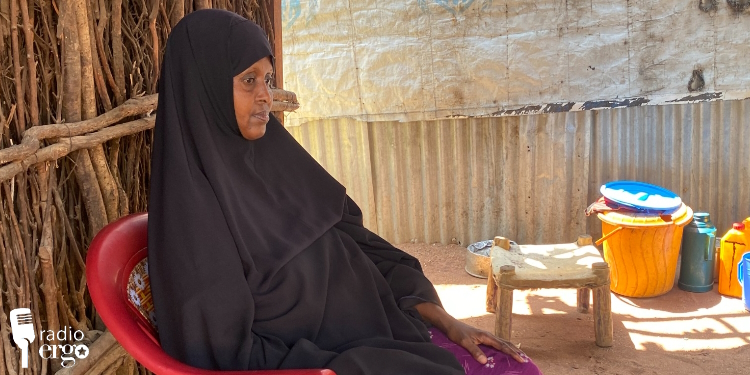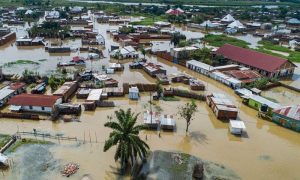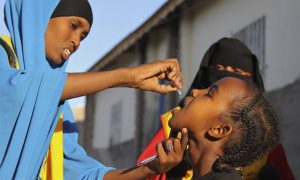
Somali refugee, Halimo Yusuf Shire, is sick with worry about her 24-year-old son, Yasin, whom she last saw on a video undergoing brutal beatings by human traffickers in Libya.
Halimo, who lives in Hagadera in Dadaab in northern Kenya, has been told to pay a ransom of $18,000 to secure Yasin’s release.
It’s a staggering amount for this refugee mother who struggles to find enough food and other basics on meagre aid handouts from the UN’s World Food Programme in the refugee camp.
Yasin was captured last October while travelling through Libya trying to reach Europe. Halimo has received several graphic videos sent to her on her WhatsApp number showing her son being beaten up by militiamen.
“My son was screaming in agony. The last video they sent was one where his arm was broken and he was being beaten. He called me two hours ago and he was crying. He has been locked up for four months because of lack of money. They need us to pay, they told us they will not leave him and will even kill him, they don’t have any mercy,” she said.
Halimo has high blood pressure and the anxiety over her son has worsened her health. She said her legs are weak and she can barely walk now. Her husband has diabetes and high blood pressure and is mostly bed-ridden.
“I am very sick and on medication, I pray that God gives me health and lowers my blood pressure. My leg is painful and I drag it on the ground, I think the blood pressure and stress have caused this,” she said.
Halimo told Radio Ergo that Yasin dropped out of school in the refugee camp in grade seven to start working as a helper to a truck driver, earning $2-3 a day. She said that his little income had been supporting the family.
They were surprised to hear that he had left on an overseas trip as an undocumented migrant, as he had never mentioned such plans to them. As a mother, she assumes that he had them in mind when he decided to take the risk.
“Yasin was forced by circumstances, he was thinking of helping his family, I think. For us, if we cook one day, we might miss out on food the subsequent days. That’s why he went on the trip,” Halimo concluded.
Halimo, her husband and nine children migrated from Kismayo in 2010 and have lived in Dadaab ever since.
Another refugee mother in Hagadera, Maryan Isse Roble, said her 16-year-old son Ismail left Dadaab trying to get to South Africa.
She received a call during the last few days of December 2023 from the smugglers in Tanzania. They demanded that she send them $2,500 for Ismail to continue the journey to South Africa.
She could not raise that amount and requested them to return her son to Nairobi. The smugglers asked her for $1,000 for his return.
She raised 92,000 Kenya shillings ($600) by giving up her refugee food aid card and collecting some other contributions.
“I gave someone the card and the food aid and they gave me a loan of 77,500 Kenya shillings. My neighbour also gave me 15,000 shillings and told me to return the money once my son is free. I did that because I didn’t know what else to do. I don’t have relatives in the diaspora and I am a mother,” she said.
Maryan said they had not been able to get any aid because she gave up her card to the person who lent her the cash, and agreed that he would keep the card until August. She and her unemployed husband and nine children were struggling to get meals.
“Our family’s situation is getting very difficult, previously we would get beans, rice and cooking oil and flour for the children. Even if we got a kilo of rice we don’t have the cooking oil to prepare it,” she said.
Maryan was a farmer living in Anole village, 30 km from Bu’ale town in Middle Juba, where they were affected by the harsh drought and left for Dadaab in 2008. Ismail is her son of her first husband who divorced her.
With no phone, however, Ismail cannot get in touch with them. Maryan is still waiting for him to return home despite paying the $600 to the smugglers.
In 2023, the number of youth migrating overseas surpassed 100, according to the chairman of Hagadera youth association, Mohamed Abdullahi Jimale.
In 2021, 23 youth were recorded as having migrated from the camp and in 2022 the number rose to 35.
Mohamed said the rampant unemployment in the camp and the closure of the technical training institutions due to aid reductions had led to the youth deciding to venture on risky migration trips.
“There are no training centres now and this is one of the reasons why youth are travelling overseas. The aid organisations told us lack of funds is the reason for the closure of the centres,” he said.
As the number of youth migrating rises, Mohamed said they could do was try to work with the refugee community to create awareness on the risks to prevent such agony for the parents and their children.
.
Sources: Radio ERGO
.
_____________________________________________________________________________________Xafiiska Wararka Qaranimo Online | Mogadishu, Somalia
_____________________________________________________________________________________Advertisement
_____________________________________________________________________________________







